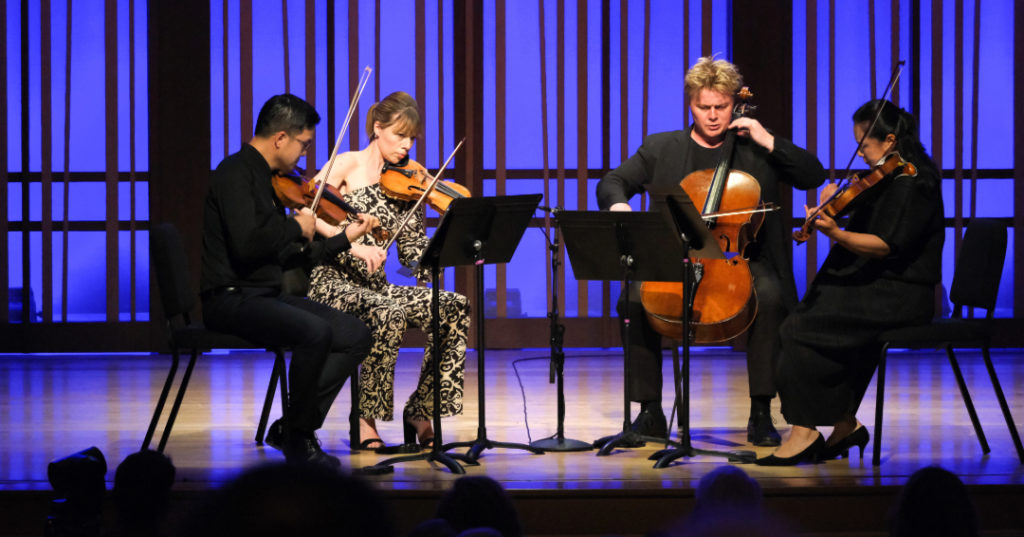SummerFest 2024 Offers A Choice ‘Danse Macabre’
Saturday’s La Jolla SummerFest program provided a snapshot of SummerFest present and SummerFest past. The programming before intermission clearly represents Music Director Inon Barnatan’s current vision of the festival: edgy contemporary offerings mixed with unusual chamber versions of familiar orchestral works. While the standard repertory gem of Franz Schubert’s Death and the Maiden String Quartet on the post-intermission half of the program represents the fare that defined SummerFest in the good old days of Oyama and Lin.
Or perhaps Barnatan is saying with this generous two and one-half hour concert that these two approaches deserve equal time in today’s SummerFest.
Thomas Adès’ 1991 Catch for clarinet, violin, cello and piano is a tightly structured modernist work that simmers with high-pitched, short motifs. What sets it apart is the clarinetist’s offstage participation in this mixed quartet. While violinist Alexi Kenny, cellist Jay Campbell, and pianist Adès played together stage center, clarinetist Mark Simpson sounded sustained tones hidden offstage until he slowly processed up one of The Conrad’s aisles adding his gentle counterpoint to the onstage trio. When Adès introduced the piece on Saturday, he offered this apology, “I was 19 when I wrote this piece.” Catch was nevertheless fun to experience.
Even more amusing was English composer Martin Butler’s Dirty Beasts, based on the sly poetry of the noted children’s author Roald Dahl. While a sextet of five winds and piano provide a contrapuntal maze of athletic themes, a narrator recites Dahl’s verse in which clever animals—The Pig, The Tummy Beast, and The Crocodile— take revenge on humans. Friday’s ace narrator of Stravinsky’s L’Histoire du Soldat Danny Burstein read Dahl’s poetry with inspired animation, although unlike the deftly scored Stravinsky work, Butler’s dense musical textures made it difficult to catch all of the poetry.
Inasmuch as Barnatan titled Saturday’s SummerFest program Danse Macabre, the celebrated Camille Saint-Saëns work Danse macabre, Op.40, appeared early on the program in the composer’s own arrangement for violin and piano. Barnatan on piano and violinist Augustin Hadelich gave a bravura account of the Saint-Saëns, balancing its bold, racing themes with sophisticated phrasing and deft dynamic contrasts. Augustin opened the concert with a stunning, brilliantly detailed performance of Eugène Ysaÿe’s Sonata in A Minor for Solo Violin, Opus 27, No. 2 “Obsession.” The music of this Belgian composer deserves a more prominent place on contemporary recital programs, and Hadelich made a most convincing case for Ysaÿe.
Adès joined Barnatan in Ravel’s two-piano version of his popular orchestral work La valse. Although the performers brought admirable interpretive finesse to this arrangement, I cannot say it does La valse any great favors. Especially when both pianos play in the instruments’ lower range, we hear too much rumble and too little definition. The warmth of an orchestra’s string sections gives Ravel’s impetuous themes the love they deserve.
An ensemble of violinists Andrew Wan and Tessa Lark, violist Tang Li, and cellist Jonathan Swensen gave a marvelous sense of urgency and power to Franz Schubert’s beloved D Minor String Quartet known as Death and the Maiden.
This concert was presented by the La Jolla Music Society as part of SummerFest 2024 on July 27, 2024, at the Conrad Prebys Performing Arts Center in downtown La Jolla.

Ken Herman, a classically trained pianist and organist, has covered music for the San Diego Union, the Los Angeles Times’ San Diego Edition, and for sandiego.com. He has won numerous awards, including first place for Live Performance and Opera Reviews in the 2017, the 2018, and the 2019 Excellence in Journalism Awards competition held by the San Diego Press Club. A Chicago native, he came to San Diego to pursue a graduate degree and stayed.Read more…

